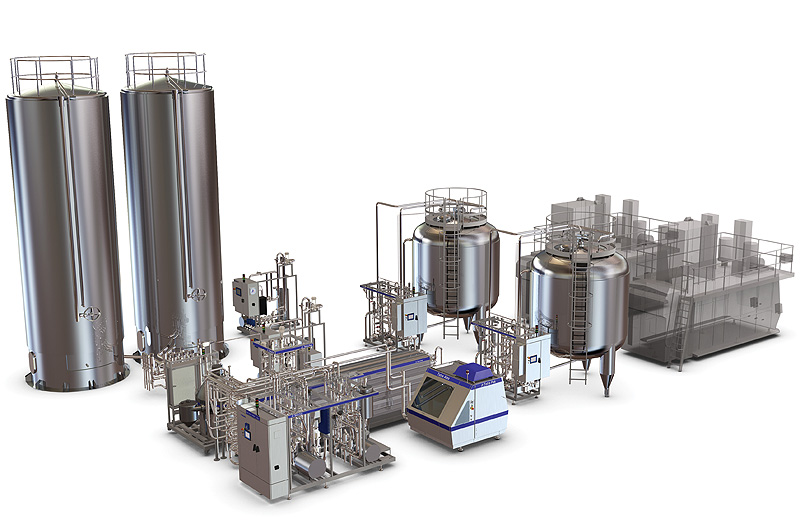
Tetra Pak
Label of quality
Constantly revolutionising the industry with its innovative solutions, Tetra Pak is just as committed to make a difference in sourcing sustainable raw material
When Tetra Pak was first formed, it was one of the first packaging companies for liquid milk. Since its inception in 1951 by Dr Ruben Rausing, Tetra Pak’s unique innovations have not only revolutionised the packaging industry, but have also changed the way food is packaged and distributed around the world forever. Having developed itself into one of the world’s largest suppliers of packaging systems for milk, fruit juices and drinks as well as many other products, Tetra Pak expanded into liquid food processing equipment, plant engineering and cheese and ice cream manufacturing equipment in 1991. Today, it is the only international company in the world able to provide integrated processing, packaging and distribution line and plant solutions for food manufacturing.
Committed to constantly revolutionising the market with innovative developments, May 2010 spelt another such launch. Tetra Pak OneStep technology, a Tetra Lactenso Aseptic solution that incorporates white milk production with a single, high-throughput process, eliminates the need for pasteurisation, pre-treatment and intermediate storage. OneStep technology marks the start of a new era by providing one unbroken step of preheating, clarifying, separating, standardising and homogenising raw milk before undergoing UHT treatment and regenerative cooling, which is then followed by a transfer to two aseptic buffer tanks.
This revolutionary technology has successfully reduced processing time from as much as two days to just a few hours, consequently resulting in a reduction of operational costs by up to 50 per cent compared to conventional solutions. In addition OneStep technology also reduces energy and water consumption by up to 35 per cent, and cuts waste and effluent load by as much as 60 per cent. These savings are estimated to reduce the carbon footprint of the production process by around 40 per cent.
The core of the innovation – having undergone three years of development – lies in combining the heat treatment, separation and standardisation stages into a single step, thereby significantly simplifying and accelerating the production process. A further advancement is that the equipment also incorporates aseptic buffering, which ensures a UHT operation that is completely automated and continuous with fewer process steps and smaller hold-ups volumes in the line.
Speaking about the innovative system, Bengt Eliasson, Tetra Pak dairy aseptic solutions manager states that the system has been developed for high capacity processors but would be suitable for medium-sized UHT operator particularly when there is a new line installation. “The whole process is far more efficient than conventional solutions, creating significant savings when it comes to operating costs and greatly reducing the environmental impact,” he adds. “And because a lot less equipment and floor space are needed, capital costs are also lower.”
With the ability to change the fat content of milk products without stopping production – and to run milk with different fat contents at the same time – OneStep technology provides outstanding aseptic line flexibility, enabling efficient production planning and high utilisation of filling machines – with up to 100 per cent availability.
Bengt comments: “OneStep technology gives customers a shortcut to UHT milk production, maximising both product quality and safety with hygienic design in every detail and full traceability and control of the line. And like all of our customised Tetra Lactenso dairy production solutions, our promise is backed by a validated performance guarantee.”
Apart from providing the industry with revolutionary solutions, Tetra Pak is also very committed to its environmental responsibility. Among its many developments, Tetra Pak recently pledged to offer 3.3 billion beverage cartons bearing the label of the Forest Stewardship Council (FSC) to customers in Germany within a year. This will represent approximately 50 per cent of Tetra Pak’s annual production of cartons in Germany.
FSC is an independent non-governmental, not-for-profit organisation that has been established to promote the responsible management of the world’s forests. It provides standard setting, trademark assurance and accreditation services for companies and organisation interested in responsible forestry. Products carrying the FSC label are independently certified to assure consumers that they come from forests that are managed to meet the social, economic and ecological needs of present and future generations.
Commenting on this new development, Sven Weidemann, managing director of Tetra Pak Germany and Switzerland highlights: “As a leading producer of food packaging, we set standards for sustainable raw material sourcing. The FSC certification represents just another step in Tetra Pak’s ongoing commitment to support responsible forest management and 99drive environmental performance – and a milestone in reliable and informative package labelling. Our ultimate goal is to have all supply certified to the highest standard, currently set by FSC. We are highly committed to increasing the number of Tetra Pak beverage cartons made from FSC-certified material as the availability of certified board increases.”
Receiving the 2010 Climate Award from the Swedish Forest Industry Federation is only further evidence of Tetra Pak’s pledge and care for its carbon footprint. The reasons given by the judges for crowning the company as the deserving winner was that ‘Tetra Pak’s packages have revolutionised the distribution of food around the globe. The company’s innovations create packages that have a lower environmental impact than packages made from other materials.’ It would not be an understatement to say that Tetra Pak takes its responsibility for sustaining the forests that provide the raw materials for its packages very seriously. Few organisations act with the same drive and reach in supporting the work towards a better environment and reducing impact on the climate. Furthermore Tetra Pak’s commitment to sustainability and innovation is not likely to wither with time.